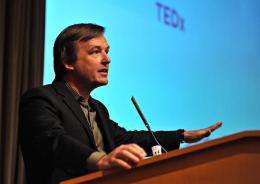Technology and creativity go "full spectrum" at TED

Technology, art and magic will mix in perspective-bending ways this week as the prestigious TED conference continues transforming from an elite retreat to a global movement for a better world.
The gathering kicks off Monday in the Southern California city of Long Beach with a roster of 1,350 attendees including Internet heavyweights, Hollywood celebrities, scientists, and other notables.
Tickets to the sold-out event cost $7,500 each, but captivating 18-minute "talks" for which the conference is renowned are made available free online at ted.com and have a growing worldwide audience.
This year's "Full Spectrum" theme refers to a range of presentations "from dazzling technology and leading-edge science to the richest veins of human creativity and interconnection."
While topics at TED and the way it connects with the world have changed with the times it remains devoted to "ideas worth spreading."
"I have a fundamental belief in the power of ideas," TED curator Chris Anderson told AFP.
"Powerful ideas, shared the right way, lead to action. Period."
TED presenters are known for combining dizzying brain power with mind-tickling spins on concepts as weighty as climate change and the devastation of sea life or as playful as dance and music.
"Everyone you speak to at TED has their own story about where these ideas have led them," Anderson said.
"Often at their core is an expanded sense of possibility and a determination to play a more proactive role in shaping the future."
TED will start with a look at the Earth through the lenses of a cosmology-loving physicist and an archeologist who discovers ancient civilizations by studying pictures taken from space.
The segment will include point-counterpoint presentations by an author adamant that technology is perilously out of control and a "futurist" convinced that it will be the world's salvation.
Presenters will include Andrew Stanton, the writer behind hit "Toy Story" films from Pixar and San Francisco symphony conductor Michael Tilson Thomas who will pack a 3,000-year history of music into 18 minutes.
Scientist Henrik Scharfe and his robot double "Geminoid-DK" will be in a "Lab" session along with Defense Advanced Research Agency director Regina Dugan and magician Marco Tempest, who combines technology and showmanship.
Dugan will bring a "humming bird drone" and other innovations from DARPA, a research arm of the US military.
Climate change will once again be a topic at TED, where former US vice president and Nobel Peace Prize winner Al Gore has taken the stage in prior years to urge action.
Oil tycoon T. Boone Pickens will speak of the need to find new ways to feed US hunger for energy.
Online social network LinkedIn co-founder Reid Hoffman and the creator of a website where people anonymously reveal secrets, will be part of talks inspired by the Internet trend of "crowd sourcing."
TED will dabble with unusual presentation styles such as Socratic discourse at an on-stage dinner party; challenging speakers to make points to a mock jury, and gathering around a real campfire.
"People come out of this with their brains stimulated," said TED community director Tom Rielly.
"All of us spend so much time with our heads down, tending to what we do in life," he continued. "TED always rejuvenates my curiosity and my inspiration."
TED for the first time with give its coveted annual prize to an idea instead of a person, naming the smart city of the future as winner.
"If you want to imagine a long-term future in which our planet is capable of sustaining 9 or 10 billion humans, new thinking about cities will be at the heart of it," Anderson said.
Prize winners are given $100,000 and a promise from TED's accomplished and innovative community to help grant a wish aimed at improving the world.
A "City 2.0" wish will be revealed in a session to include the mayor of Rio de Janeiro.
Last year's TED prize went to French street artist JR, who used his wish for a global InsideOutProject.net that let people tell their stories in giant self-portraits plastered on any open surfaces.
"JR's Inside Out project was a spectacular success," said Anderson, who passionately advocates turning ideas into meaningful actions. "I couldn't be more excited about the TED Prize centered on cities."
TED conferences started 28 years ago in California as annual enclaves where elite thinkers got together to explore life from unusual perspectives.
The nonprofit Sapling Foundation began making recordings of talks available online as podcasts in 2006, then began streaming videos free at a TED.com.
TED talks have spread to television stations around the world and a free application lets TED videos be viewed on Apple's iPad.
Volunteers have been translating TED Talks into myriad languages.
"TED's growth in recent years has shifted it from being mainly a conference to being, I guess, mainly a platform to nurture the spread of good ideas," Anderson said.
"I would like TED to stand for curiosity, the thrill of learning, inspiration, a journey toward a wiser world."
(c) 2012 AFP



















